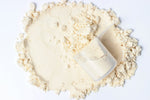
Whey Protein for Beginners: A Complete Guide to Getting Started
, by Sandesh Prasannakumar, 9 min reading time
New Year Sale Is Live - Shop Now!
New Year Sale Is Live - Shop Now!
New Year Sale Is Live - Shop Now!
New Year Sale Is Live - Shop Now!
New Year Sale Is Live - Shop Now!
New Year Sale Is Live - Shop Now!
New Year Sale Is Live - Shop Now!
New Year Sale Is Live - Shop Now!
New Year Sale Is Live - Shop Now!
New Year Sale Is Live - Shop Now!

, by Sandesh Prasannakumar, 9 min reading time
Whey protein is one of the most popular and effective supplements available, especially for those new to fitness or looking to improve their diet. It’s an excellent source of high-quality protein that supports muscle growth, recovery, and overall health. Whether you're just starting your fitness journey or looking to enhance your diet, this complete guide will walk you through everything you need to know about whey protein.
Whey protein is a byproduct of the cheese-making process, derived from the liquid portion of milk. After the whey is separated from curds, it’s processed into a powder that is rich in essential amino acids, making it a complete protein. Whey is especially valued for its high bioavailability, meaning your body absorbs and uses it more efficiently than other protein sources.
Whey protein is packed with branched-chain amino acids (BCAAs) like leucine, which are crucial for muscle protein synthesis. For beginners starting a workout routine, consuming whey protein helps repair and grow muscle tissue after exercise, leading to better strength and muscle mass gains over time.
Exercise, especially for beginners, can lead to muscle soreness and fatigue. Whey protein helps speed up the recovery process by providing essential nutrients that repair muscle tissue faster, allowing you to get back to your workouts sooner.
Whey protein can also assist in weight loss. It helps increase satiety, meaning you feel fuller for longer, which can reduce overall calorie intake. When paired with regular exercise, consuming whey protein helps preserve muscle mass while promoting fat loss.
For beginners who struggle to meet their protein needs through food alone, whey protein is an easy and convenient solution. It can be quickly mixed into shakes, smoothies, or even water, providing a fast and portable source of protein.
Whey protein is extremely versatile and can be used in several different ways, depending on your preferences and fitness goals. Here’s how you can incorporate it into your daily routine:
The most common use for whey protein is as a post-workout shake. After a workout, your muscles need a quick source of protein to repair and grow. Mix a scoop of whey protein with water or milk and drink it within 30 minutes of completing your workout.
If you're struggling to meet your daily protein needs, you can use whey protein as a snack or meal replacement. Blend it into a smoothie with fruits, vegetables, and healthy fats like nuts or seeds for a balanced, nutrient-rich meal.
Consuming whey protein before bed can help your muscles recover while you sleep, especially after an evening workout. It’s a great way to ensure your body has the necessary nutrients for overnight muscle repair.
Whey protein can be easily incorporated into recipes like pancakes, muffins, or protein bars. This is a great way to make your snacks healthier while increasing your protein intake.
The amount of whey protein you need depends on your fitness goals and overall protein requirements. A common guideline for beginners is to consume around 1.6-2.2 grams of protein per kilogram of body weight per day, with some of that protein coming from whey.
While whey protein is a great tool, it’s essential to get most of your protein from whole foods like chicken, fish, eggs, and legumes. Using whey protein as a supplement, not a replacement for real food, will ensure you get a variety of nutrients.
For beginners, it’s important to monitor your total protein intake to ensure you're meeting your daily needs. Many people either consume too little or too much protein, which can affect your results.
One of the most important times to consume whey protein is after a workout. Skipping this opportunity can delay muscle recovery and reduce the effectiveness of your workouts.
When choosing a whey protein supplement, look for reputable brands that use high-quality ingredients and have transparent labeling. Here are some top picks for beginners:
Known for its high-quality, minimal-ingredient formula, Genetic Nutrition offers a great option for beginners looking for a clean, effective whey protein supplement.
This is one of the most popular whey protein products on the market due to its high protein content, great taste, and smooth mixability. It’s an excellent option for those new to using protein supplements.
Dymatize offers a whey protein isolate that is perfect for those with lactose sensitivity or who want a low-carb, low-fat option. It’s easy to digest and ideal for beginners focused on lean muscle growth.
MyProtein is known for its affordability and variety of flavors, making it a great option for beginners who want a cost-effective protein powder without compromising on quality.
Whey protein is an excellent supplement for beginners, offering an easy way to meet your protein needs, support muscle growth, and improve recovery. Whether you’re looking to build strength, lose fat, or simply maintain a healthy diet, whey protein can be a valuable addition to your fitness routine.
Start by incorporating it into your post-workout routine, smoothies, or meals, and choose a high-quality brand that suits your goals and preferences. With consistent use and a balanced diet, whey protein can help you achieve your fitness goals faster and more effectively. For all your protein and supplement needs, visit Genetic Nutrition!